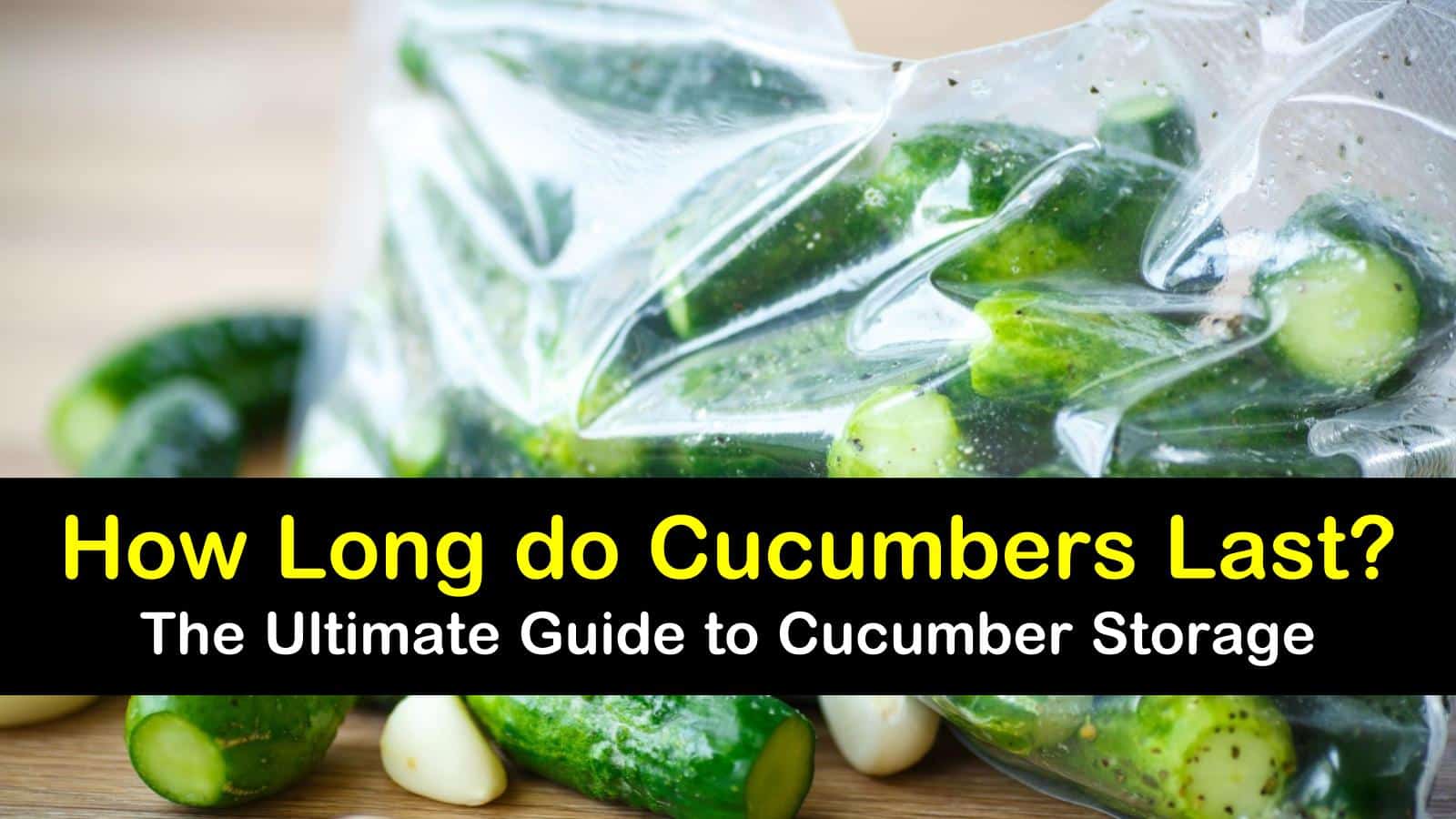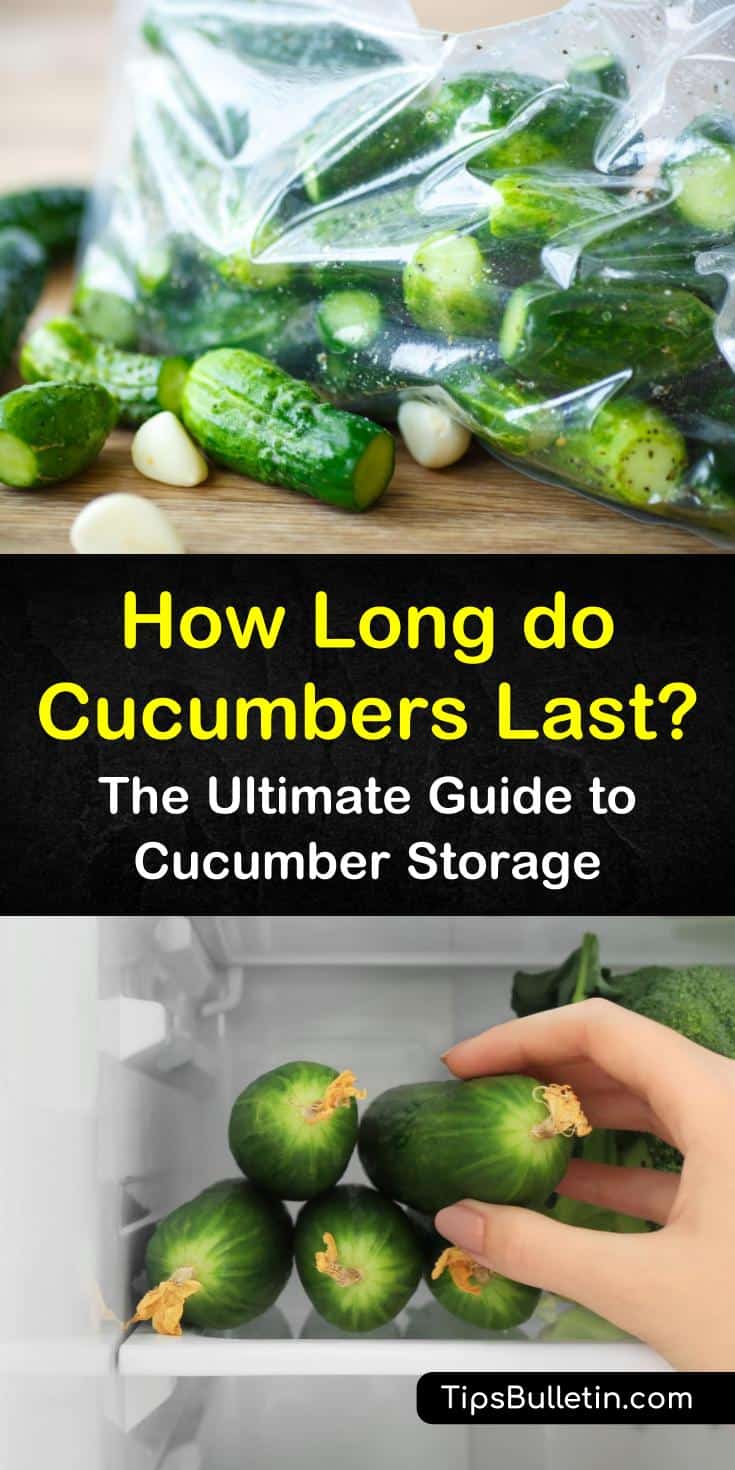No one wants to go to the grocery store every day, but sometimes it seems that it is the only way you will have the freshest produce on hand. Fresh produce doesn’t come with a sell-by date or an expiration date, so the only way you have to track it is the actual date you purchased it. This lack of dating leaves many of us wondering how long do cucumbers last?
Cucumbers are a popular produce choice because they are inexpensive and extremely versatile. You can use fresh cucumbers to snack on, or you can use them as an addition to any meal in various forms.
How you end up using your fresh cucumbers depends on whether you purchased a pickling variety or a slicing variety. Pickling cucumbers are a smaller and firmer variety, and thanks to those characteristics, they have a longer shelf life. The types of cucumbers you purchase, as well as the way you store the cucumber, determine how long your cucumbers will last.

How Long Can You Store Cucumbers?
How long do squash last, as well as any other type of fruit or veggie is determined by your storage method. It also depends on when you want to eat them or use them in a recipe.
How long your fresh cucumbers last is up to you. The best way to store cucumbers depends on what you plan to use them for and when. If not stored correctly, the shelf life of cucumbers reduces drastically. You certainly don’t want to waste this delicious and nutritious veggie so proper preservation is important.
How Long do Cucumbers Last?
Proper storage of cucumbers depends on the variety and if they are garden fresh or store-bought. When properly stored, your cucumbers will last at least a week, if not more. The exact shelf life depends on the variety of cucumber, as pickling cucumbers keep for up to two weeks.
When storing cucumbers, the storing temperature plays an essential role. Cucumbers do best when stored at a temperature of 55°F. When storing at temperatures below 40°F, pitting and water-soaked spots appear on the skin.

Storing Cucumbers in the Fridge
There is quite a difference in pickle vs cucumber regarding longevity. When it comes to finding out how long do cucumbers last in the fridge, the exact answer varies based on the variety of cucumber in question and whether the cucumber is being properly stored or not. The best place inside the fridge for keeping cucumbers crispy is inside the vegetable crisper drawer.
To extend the shelf life of Japanese and English cucumbers, wrap them in airtight plastic wrap before placing them in the crisper drawer. Regular slicing cucumbers and Persian cucumbers have a one-week shelf life when stored properly in the fridge.
English and Japanese cucumbers last anywhere from seven to ten days inside the crisper drawer. Pickling cukes have the longest shelf life when adequately stored; they can remain in the fridge for one to two weeks.
How to Keep Cucumbers Fresh
To keep cucumbers fresh and to keep beets fresh, like all other vegetables, you need to follow proper food storage guidelines to preserve taste and valuable vitamins and minerals. The ideal way to store cucumbers and most other veggies is to place them whole inside a sealed plastic bag inside the vegetable crisper drawer. Do not wash or peel store-bought cucumbers before storing them.
The skin allows the cucumbers to last longer inside the fridge, as it forms a protective layer around the vegetable. The skin is also where the majority of the nutrients are. Before storing garden fresh cucumbers, wash away any dirt or debris.
When washing cucumbers, do not use any soap or chemicals; rinse with cold water, and leave the skin intact. Allow the cucumbers to completely dry before wrapping in plastic wrap or aerated plastic bags. While the ideal place to store fresh cucumbers is inside the crisper drawer, you may also store them in a cool, dry area that does not exceed 55°F.
Follow these same guidelines to keep peppers fresh, too, whether you use bell peppers or spicy jalapenos.
Keeping Sliced Cucumbers Crisp
For a quick and healthy snack, cucumber slices are a great way to go. Sliced cucumbers are also a dieter’s friend, as a single eight-inch long cuke contains only 45 calories. These tasty treats provide you with 14% of your daily vitamin C, 5% of your daily dose of iron, and 6% of your dietary fiber, plus the skin contains a variety of other nutrients that your body needs.
The downfall is how quickly cut cucumbers begin to wilt, especially when kept at room temperature. Keep cut cucumbers fresh by covering the cut end with a damp paper towel and placing the entire thing in a plastic baggie.
The same concept applies when storing sliced cucumbers; wrap them in a damp paper towel to keep the flesh moist, and then store in an airtight container. Use all cut or sliced cucumbers within two days to prevent them from going bad.
When storing sliced cucumbers, keep them away from new cucumbers, as well as ethylene-producing fruits. Fruits like bananas, melons, peaches, pears, and apples all produce ethylene gas, which causes your cucumbers to degrade faster. Store on opposite sides of the refrigerator or in separate drawers.
Can You Freeze Cucumbers?
Although it is possible to freeze cucumbers, we don’t recommend it due to their high water content. While they will freeze, cukes do not freeze well due to the moisture inside of them turning to ice once the cucumber is frozen.
Once the cucumber thaws, you will be left with wilted, mushy cucumbers that are not very tasty to eat in a salad or other fresh dish. Soft cucumbers that have been frozen are best used in smoothies, soups, or to add a splash of flavor to drinks.
If you decide to freeze cucumbers, wash, peel and slice them first. Once sliced, place them in a single layer inside a freezer container. Next, you need to salt them; use one tablespoon of salt for seven cups of cucumbers. Refrigerate them overnight, but no longer than 24 hours.
Drain the water from the container and press down on each cucumber to remove any excess moisture. Next, add some white sugar and distilled white vinegar and mix to dissolve sugar. You can play with the ratio based on how sweet or sour you want the cukes.
If you didn’t use a freezer container, now is the time to swap the cucumbers and vinegar solution to something appropriate. Place inside the freezer where they will keep for up to one year.
Preserving Your Fresh Cucumbers
Greek and other cucumber salads are a great way to utilize fresh cucumbers. Different ways to use them include making salsa, tzatziki sauce, or cucumber jelly. You can also make cucumber chips by dehydrating thinly sliced cucumbers.
Juice your fresh cukes in a juicer to make flavored ice cubes to add to a variety of cold, refreshing drinks. However, the most common and popular method for preserving these delightful veggies is by making pickles or relishes with them.
This option is the most popular because pickling provides the longest shelf life for your cucumbers, and it is so simple to do. When making pickles, only use pickling cucumbers, never the slicing variety, for the best flavor. There are numerous recipes you can choose online, but here is a quick and easy way to pickle cucumbers to make delicious refrigerator pickles.
Add all ingredients minus the pickling cucumbers to a one-quart glass jar and stir to mix. Wash and slice the cucumber into spears or slices and add. Secure the lids and shake well. Refrigerate for two days before eating. Use within one week for the best quality.
How to Tell if Cucumbers are Bad
If you are picking your cucumbers directly out of the garden, watch for signs of over-ripeness. Look for misshapen, discolored, or moldy spots. Overripe cucumbers are mushy or have soft spots. Ripe ones are firm to the touch.
To determine if your cucumbers are bad when stored in the fridge, use your sense of smell, sight, or touch. Look at the cucumber; if you see any mold growth, that is a sure sign it is bad.
Do not attempt to cut the mold off and eat the remaining part of the cucumber, as the high water content allows the mold spores to travel through the entire cucumber and contaminate all of the flesh. If it feels squishy at the ends, you can cut off the softer spots and eat the firmer meat as long as no mold is present.
The last thing to look out for is a slimy, milky film on the flesh of the cucumber. This film is noticeable on sliced cucumbers; once the film appears, everything in the same container as the cucumber is contaminated and needs to be thrown out.
Eating rotten or spoiled cucumbers is a quick way to subject yourself to various food borne illnesses, so when in doubt, throw it out.

Thank you for reading our post on how to keep cucumbers fresh. If you found any of our cucumber storage tips and ideas useful, please share our post with others on Facebook and Pinterest so they can also learn how long do cucumbers last.